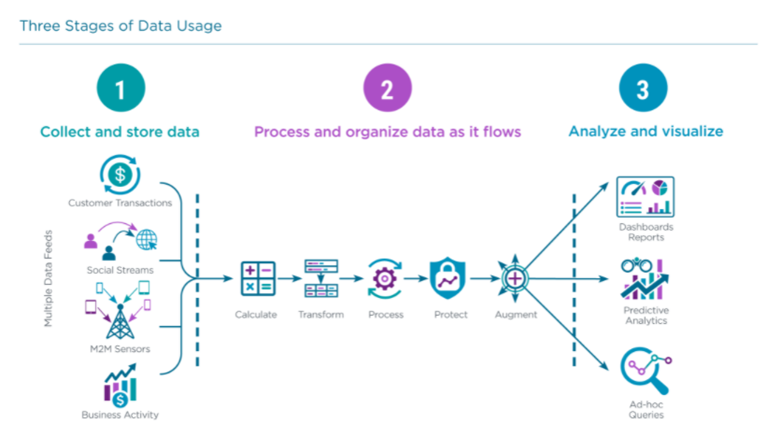
Data mining is essential to the success of many different types of organizations. From healthcare to retail, nearly all industries can benefit from data mining.
According to an article by Iberdrola, 80% of organizations that apply business intelligence find the process of data mining important. But what is data mining, how does it benefit businesses and how has it impacted marketing, in particular? Let’s start by tackling the first question.
Data mining is both a practice and a process of gathering information from a variety of data sources. These sources hold millions of pieces of isolated data. Data can be mined from large databases, such as a CRM, e-commerce websites, social media platforms like LinkedIn and a plethora of other sources.
After raw data is gathered, professionals analyze it and turn it into usable knowledge. Once the data makes sense, it can be represented through data visualization tools, such as graphs, maps or charts.

Figure 1: Breaking overall data activity into three foundational stages allows organizations to ask pertinent questions and understand the technical challenges involved in modern data management and analysis. Learn more in CompTIA’s Closing the Data Skills Gap whitepaper.
The reason why data mining is valuable is because it can generate new market opportunities for organizations. It does this by giving businesses the insights they need to detect and predict the behavior of consumers. This enables them to better meet customers’ needs.
Data mining can help organizations make better business decisions as well. It can minimize risks, decrease customer churn and increase sales. It not only drives good decision making, but also promotes various types of fraud detection. Credit card fraud detection is one such example.
Data mining can be a complex process, but it is easy to understand. Data mining happens when data professionals dig into large data sets to locate anomalies and patterns in the data. They do this for the purpose of predicting outcomes.
To successfully mine information from a large amount of data, professionals use different data mining techniques. A few data mining tools and techniques include:
The data mining process cannot happen without pre- and post-processes, such as data exploration, model validation and model performance.
Interested in getting into data mining or another data-related role? Take a look at Analyze This: CompTIA’s New Data Analytics Certification.
Data mining may sound futuristic, but it’s well over fifty years old. The article The Impact of Data Mining on Marketing explains that data mining began as simple data collection. The data collection was enabled by computers, disks, tapes, etc. This information revealed revenue totals and sales histories to organizational leaders.
As decades passed, data access developed. It allowed industries to gather information that was highly detailed about business operations. The data was stored using relational databases.
Later, data warehousing was invented. Data warehousing reports on and analyzes data. A data warehouse stores data, both historical data and up-to-date data, from many sources in a central location. The data can be used to craft analytical reports.
From all of these practices and technologies, modern data mining was born.
Data mining consists of several major elements. According to Data Mining: Definition, History, Elements, Applications they are:
With the right training, professionals can perform these tasks and help businesses reap the benefits of data mining.
Are you an information technology professional? Here are 7 data skills IT pros need right now.
Now that you understand what data mining is, you’re probably wondering, “How is data mining used in marketing?” Great question.
Data mining has forever changed marketing. First, data mining in marketing enables real-time recommendations for businesses that track purchases. These recommendations help businesses increase sales. Chances are, you have been on the receiving end of this data mining technique.
For example, have you ever added an item to your Amazon shopping cart, only to have more products recommended? If so, know that data mining algorithms made those recommendations. If you end up making additional purchases, Amazon’s sales go up, and
Data mining makes it possible for businesses and marketers to get customer data from databases powered by artificial intelligence. This allows companies to create better marketing campaigns and marketing strategies. Big data is what fuels data mining in marketing.
Gone are the days when marketing companies had to rely on focus groups and case studies alone to get relevant data. According to the Fuel Cycle blog, data mining is a top market research strategy using market research software with built-in machine learning and algorithms to glean insights from databases or other large stores of information
Due to data mining in marketing, marketers can gain greater insight into consumer behavior than ever before. This promotes accurate forecasting and better sales. Data mining is also commonly used in market segmentation.
Data science jobs tend to pay well. For example, a job in data mining in New York City pays an average of $65,170 per year on average, but can go all the way up to $173,852.
To work in data mining in marketing, you’ll need specialized skills. CompTIA Data+ certification training provides the skills needed to succeed in a data-related role.
CompTIA Data+, which will be available in Q1 of 2022, offers a full training suite of Official CompTIA CertMaster products. These products include:
When learners buy a training bundle that includes both CertMaster Learn and CertMaster Labs, they will enjoy an integrated training experience. Find out more in The New CompTIA eLearning Bundles: Where Knowledge and Practice Intersect.
Need more information about your online IT training options with CompTIA? Check this out.
Once you receive training for the CompTIA Data+ certification, it will be time to take the certification exam. Some of the topics and skills the certification exam covers are:
With CompTIA Data+, you can prove to employers that you have the skills needed to perform well in a data-related role.
CompTIA Data+ covers the data analytics skills you need in marketing. Start studying with CompTIA CertMaster Learn + Labs for Data+. Sign up for a free trial today!
Read more about Data and Analytics.
Tags : Data and Analytics